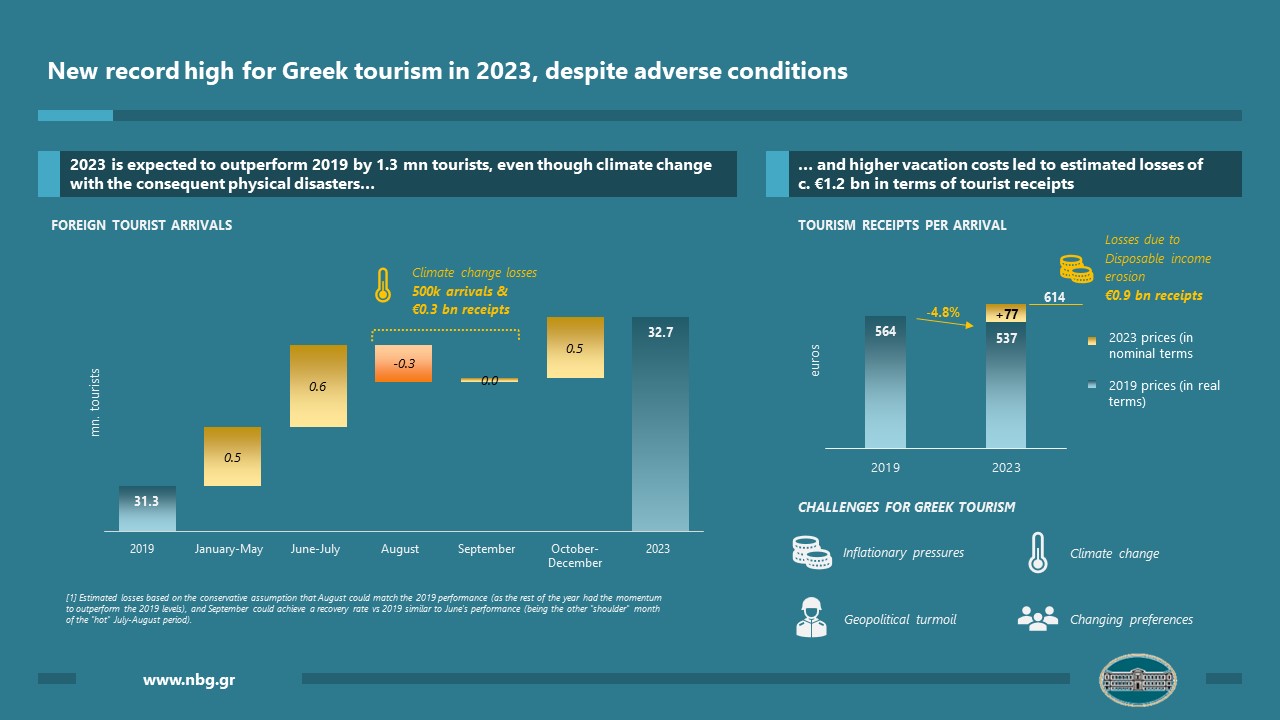A new all-time-high for arrivals has been recorded in the Greek Tourism sector during summer 2023 (16.9 million arrivals, +2% vs 2019), which simultaneously boosted its share in the Mediterranean market (25% from 24% in 2019) and increased employment in the sector (+9.7% in net hirings vs 2019). The main driver has been air arrivals (+14% vs 2019), primarily from traditional developed markets (+19% vs 2019), with the US standing out for its dynamism (+24% vs 2019). In contrast, road arrivals, mainly from Balkans, remained at levels lower than 2019 (-8%).
The positive outlook "hides" an interesting aspect: Not all months of summer 2023 have exceeded the arrivals’ level of 2019. While the June-July period has been 7% higher than 2019, August ended up at -4% (vs 2019). Natural disasters (wildfires) and extreme weather conditions due to climate change could be considered as critical parameters for the weak performance in August, which, based on a conservative assumption, led to a potential loss of 0.3 million arrivals (based on the conservative assumption that August could have approached the 2019 level). Similar results are observed for September, with floods allowing only a marginal increase in arrivals (+0.6% vs 2019) – a performance significantly lower than that of June (the other “shoulder” month), resulting in an additional loss of 0.2 million arrivals.
As for the last quarter of 2023, the strong air traffic in October (+21% compared to 2019) and the high performance of flights in the first 20 days of November (+11% compared to 2019), combined with the gradual recovery of road arrivals to pre-pandemic levels, lead our estimate for tourist arrivals to be close to +11% compared to 2019 (accelerating from the +3% recorded in the first 9 months of the year).
In this context, Greek tourism is expected to set a new record in arrivals this year (+4% compared to 2019), with receipts exceeding €20 billion – a level consistent with our previous estimate (NBG report for Q3 2022) – thus ending up 13% higher than in 2019. Remarkably, this outstanding performance is achieved in a year with adverse conditions, which has potentially cost Greek tourism receipts of around €1.2 billion:
- The impact of the climate crisis, as mentioned earlier, resulted in a loss of 0.5 million arrivals, corresponding to €0.3 billion in receipts.
- High inflationary pressure has limited tourists' budgets, leading to a contraction in real spending per arrival (-5% compared to 2019). Consequently, the relatively limited real consumption of tourists has led to an additional loss of €0.9 billion in receipts (under the conservative assumption that this year's real spending per tourist could reach 2019 levels).
Looking ahead to 2024, challenges persist due to geopolitical uncertainty, the ongoing climate crisis, and persistent inflationary pressure. However, two positive parameters should be taken into consideration:
- Early demand signals for 2024 are favorable, with flight reservations in the last month surpassing both 2019 levels (+37%) and 2022 levels (+34%).
- This year's marginal improvement in seasonality (52% in the summer of 2023, compared to 53% in 2019), combined with tourists' preference for off-season holidays to avoid overcrowding and extreme weather conditions, provides room for increased demand in both "alternative" months and "alternative" destinations.
See the infographic:
